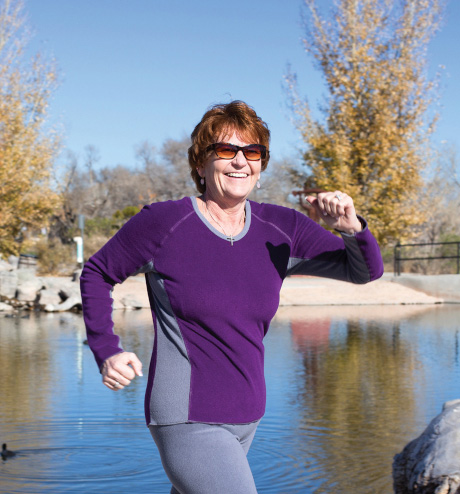Now that the days are longer and the weather’s warmer, it’s a great time to start taking daily walks – if you aren’t already doing so.
Just 30 minutes a day can keep your heart healthy, and improve your well-being, according to Shane Cass, DO, medical director for ambulatory services at Sandoval Regional Medical Center in Rio Rancho.
Cass, who is also an assistant team physician for the UNM Lobos, says he tells his patients that getting started with an exercise routine shouldn’t feel overwhelming. While experts recommend walking for 30 minutes a day, it’s OK to break up those walks into three 10-minute stretches.
To Track or Not to Track
Not many studies have been conducted to determine whether wearable tech such as a Fitbit will really help you to lose weight, Cass says.
“Research has shown that these devices are accurate for tracking data, but there is little evidence yet to prove that these trackers and monitors improve health outcomes in the long term,” he says. “They do have some short-term benefits, though, and may be helpful for some (people) to get active and motivated.”
Although the jury is still out on activity trackers, wearing one just might motivate you to walk around the block one more time to meet that daily 10,000-step goal.
Cass, who doesn’t wear an activity tracking device but as a runner sometimes logs his time and distance, says he has suggested to some of his patients to wear one.
“I think these are ideal for people who need a little motivation and need to see the activity that they are doing,” he says. “I've also suggested it for those who think they get 10,000 steps a day to confirm it, especially if they have chronic disease states… . Sometimes it's helpful for them to see that they only get, say, 5,000 steps a day. Usually they say, ‘Wow. I had no idea I was needing to double that activity.’"
Get Moving
The American Heart Association and other medical organizations recommend 150 minutes of moderately intense aerobic activity per week as a minimum for health and well-being. This translates to about 30 minutes of moderate activity five days a week.
Moderate intensity, Cass explains, means you can hold a conversation while engaging in the activity.
“I’ll always tell people to go slow and take baby steps when they start out on an exercise program,” Cass says. “This makes it more manageable and limits their exposure to injury.”
The goal, he adds, is to get people to find an activity they enjoy, and encourage life-long activity. It's always best to just start out with a walk.
Tips:
- Don’t rush into aggressive workouts, Cass recommends.
- Start with 10-minute increments of activity, such as a walk, to reach your 30-minute target. “Studies have also found that even breaking this activity up into three 10-minute session through the day can be beneficial,” he says.
- The American Heart Association suggests planning “a daily or weekly workout date with a friend or family member and promise to hold each other accountable to keep the date. Doing an activity with another person doubles as social time and will make fitness seem like less of a chore.”
- Next time you’re on North Campus, consider a walk around the UNM North Golf Course, 2201 Tucker NE, which features signage that help walkers navigate a two-mile perimeter trail.
The American Heart Association’s website also offers tips on how to start a walking club. As a walking club organizer, you promote and encourage those in your club to challenge each other and become walking buddies.

